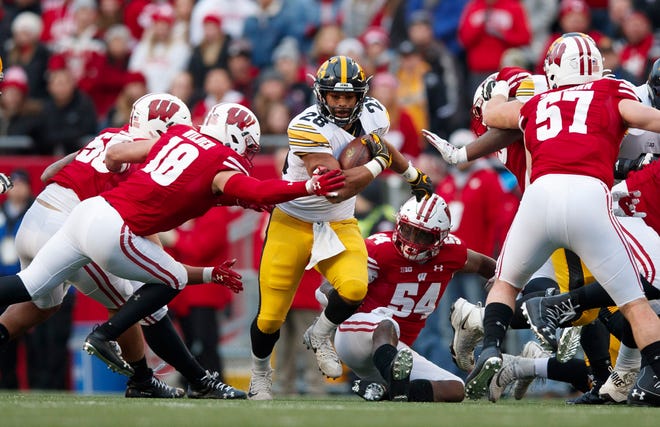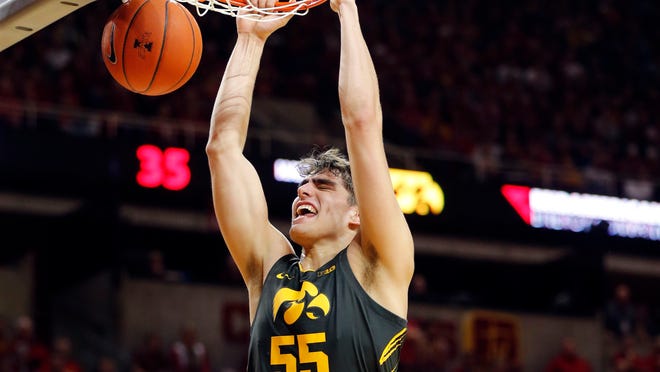Iowa's college athletes could profit from name, image, likeness under Senate bill
 Ian Richardson
Ian RichardsonIowa colleges and universities couldn’t prohibit college athletes from hiring agents and profiting from the use of their names, images and likenesses under a bipartisan Senate bill that advanced Tuesday.
The bill also includes a provision allowing colleges and universities to require student-athletes to deposit their earnings from endorsement deals in trust funds until the athletes are no longer eligible for athletic activities.
Sen. Brad Zaun, R-Urbandale, and Sen. Nate Boulton, D-Des Moines, introduced the bill last month, putting Iowa among several states exploring legislation surrounding college athletes' name, image and likeness rights. California became the first state to pass such a law in September.
Boulton on Tuesday said the bill does not directly compensate athletes for playing sports, but it does keep athletes from being shut out of capitalizing on their own names, images and likenesses in the lucrative industry surrounding college athletics.
"We’re seeing more money infused into a system that has created two real outlets for that money: coach’s salaries and facilities," he said. "As all the licenses happen, as all the advertising happens — and now as sports gambling happens — all the money flowing around that system is isolated away from the student-athletes that are putting their bodies on the line."

Representatives of Iowa colleges and universities who spoke Tuesday pushed back on the legislation, saying a variety of rules among states isn't the answer to a national issue.
"This cannot be a solution that is approached with 50 different answers," said Keith Saunders, state relations officer with the Iowa Board of Regents. "We all need to play by the same rules."
Saunders said athletic departments at Iowa schools are working with the NCAA on a solution and pointed to efforts among members of U.S. Congress who are also working on legislation.
In late October, the NCAA Board of Governors voted unanimously to give students the opportunity to benefit from name, image and likeness use "in a manner consistent with the collegiate model." Work on rules is underway with an eye toward making changes by January 2021.
Boulton said the bill, which doesn't go into effect until July 1, 2023, would give the NCAA time to address the issue on its own but that the NCAA has chosen to "punt" on the issue each time in the past.
The bill, Senate File 2058, would apply to Iowa's regent universities, community colleges and private colleges and universities.
According to the bill, team contracts could not prevent athletes from receiving compensation for use of their name, image or likeness rights, or their "athletic reputation," for a commercial purpose when the athlete isn't engaged in official, mandatory team activities.

The bill would limit mandatory team activities to 20 hours per week during the athletic season and 8 hours per week in the offseason. College athletes could also obtain professional representation from agents, financial advisers or attorneys.
But athletes would not be able to enter into a contract that requires them to display a sponsor's apparel, equipment or beverage during team activities, if doing so is in conflict with a provision of the athlete's contract.
A college athlete would also be required to disclose their full contract to a designated official of the college or university.
Colleges and universities could require athletes to deposit some or all of their earnings into a trust fund, with state tax deferred, until the athlete is no longer eligible for athletics.
Boulton said the trust account is a unique portion of the bill meant to protect students from extra pressure while they're enrolled by keeping the money from endorsement deals separate from their own finances.
"(It's) to try and protect our student-athletes from having undue pressures on them while they're enrolled," Boulton said. "Both peer pressures, as well as — in a state that does have sports gambling — the idea of the outcome on Saturday influencing a payday on Sunday."
House File 2282, a similar bill sponsored by Rep. Ras Smith, D-Waterloo, and Rep. Joe Mitchell, R-Mount Pleasant, is scheduled for a subcommittee hearing next week. The House bill would go into effect 18 months earlier, on Jan. 1, 2022.
Ian Richardson covers the Iowa Statehouse for the Register. Reach him at irichardson@registermedia.com, at 515-284-8254, or on Twitter at @DMRIanR.
Your subscription makes work like this possible. Subscribe today at DesMoinesRegister.com/Deal.